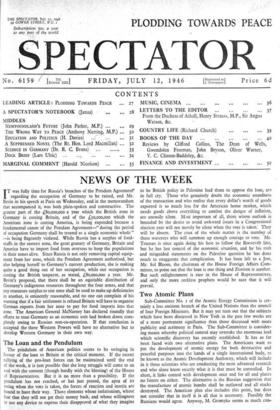The Loan and the Pendulum
The pendulum of American politics seems to be swinging in favour of the loan to Britain at the critical moment. If the recent rallying of the pro-loan forces can be maintained until the end of the week, it is just possible that the long struggle will come to an end with the consent (though hardly with the blessing) of the House of Representatives. But it is no more than a possibility. If the pendulum has not reached, or has just passed, the apex of its swing when the vote is taken, the forces of reaction and inertia are bound to have their way. Those elements whose isolationism, whose fear that they will not get their money back, and whose willingness to use any device to express their disapproval of what they imagine
to be British policy in Palestine lead them to oppose the loan, are in full cry. Those who genuinely doubt the economic soundness of the transaction and who realise that every dollar's worth of goods exported is so much less for the American home market, which needs goods above everything to combat the danger of inflation, are uneasily silent. Most important of all, those whose outlook is bounded by the desire to avoid awkward issues in a Congressional election year will not merely be silent when the vote is taken: They will be absent. The crux of the whole matter is the number of these waverers who will summon up enough courage to vote. Mr. Truman is once again doing his best to follow the Roosevelt line, but he has lost control of the economic situation, and by his rash and misguided statements on the Palestine question he has done much to exaggerate that complication. It has been left to a Jew, Mr. Sol Bloom, the chairman of the House Foreign Affairs Com- mittee, to point out that the loan is one thing and Zionism is another. But such enlightenment is rare in the House of Representatives, and only the more reckless prophets would be sure that it will prevail.






























